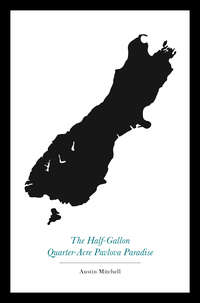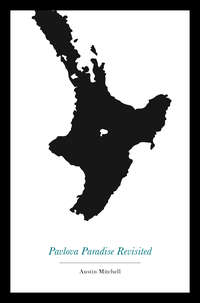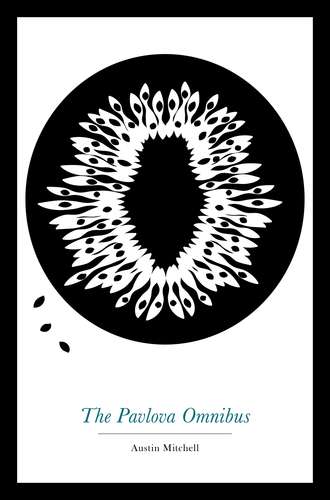
Полная версия
The Pavlova Omnibus
Most people are exhausted by the demands of their homes and leave them only to rest and recuperate. Yet for those of insatiable energy there is a range of do-it-yourself activity outside. Elsewhere some act, sing or play, others pay to see them. In New Zealand everyone has the right to sing in grand opera, dance classical ballet or play in the symphony orchestra. Unfortunately all too many of them do.
Voluntary effort runs the political parties, and helps educate the children. Volunteers also provide nursery education, many of the welfare services and much of local government. Political scientists equate a country’s degree of democracy with the vigour of voluntary organisations. New Zealanders are among the most enthusiastic joiners in the world. If wife swapping or sex orgies did catch on, they would form committees to organise them. The purpose of an organisation is usually irrelevant. It exists mainly to provide an outlet for energy, bring people together, and keep them off the streets.
Committees also organise sports. Tom Pearce’s Law states that one hundred full-throated spectators and ten organisers, officials and administrators are necessary to put one man on the rugby field, a bigger back-up than the American army has hors de combat. Old rugby players never die, they graduate to committees. Study of the labyrinthine processes and the inscrutable personalities of the New Zealand Rugby Union is the Kiwi counterpart of the CIA science of Kremlinology.
Sport isn’t merely a physical expression of do-it-yourself. New Zealanders aren’t a peaceful people and if they can’t fight German enemies or thump American allies they need aggressive sport as an outlet for their violent instincts. War and sport bring out the beast in them. Yet sport is the cause of the country’s social progress. Would the social security system have come into being without the incentive of the 20,000 injuries a year inflicted on the rugby field? Sport is also a major political issue. Look at the energy expended in keeping politics out of sport or Maoris out of South Africa or South Africans out of New Zealand. Look at the interruption of parliamentary debates to announce results, or at the meteoric rise of one Minister who threatened to resign from Parliament if his local trotting club didn’t get extra racing days. Sportsmen are the folk heroes. If they could manage words of more than one syllable they would be the nation’s leaders too. Sport is a vital element of colour and excitement in the people’s lives. In short it is their religion.
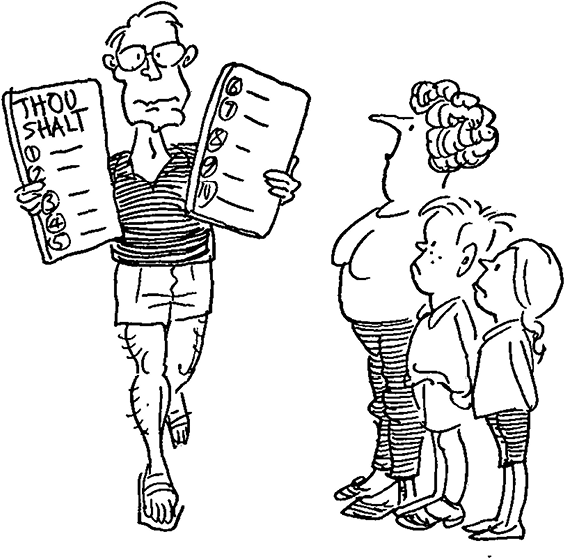
This doesn’t mean they are all sportsmen. A 1966 survey of leisure time showed that two thirds of those interviewed played no sport and a fifth took no interest, but these are lower proportions than any other country and the same survey showed that a third of the men devoted five hours or more to sport each week. New Zealand has more sporting opportunities. Britain boasts 64 racecourses for 50 million people and as many universities. New Zealand has only seven universities but 80 racing clubs and 30 trotting clubs. It crams 271 licensed racing days and 133 trotting days into a 365-day calendar.
To succeed, Kiwis concentrate their energies on a limited range of sports. The girls concentrate on hockey and netball. Men play rugby and cricket. Swimming, soccer and rugby league are also permitted. One of them you must be good at or at least interested in if you are to avoid ostracism; Lord Rutherford wasn’t good enough to be an All Black so the only future for him was to go overseas and split the atom.
Sport is the only field where professionalism and skill are tolerated. Kiwis excel at rugby because their children are drilled from an early age, adolescents inspired with a lust to kill which makes the Kamikaze pilots of World War II look like simpering girls. A couple of games after their arrival, a French rugby team had suffered two sprained ankles, two back injuries, two hamstring injuries, one scalp wound and one burst blood vessel. Harder grounds were not wholly to blame. Also New Zealand had the wisdom to concentrate on a game which only four other countries play, and they only as one game among several. Thus New Zealand is able to lead the world, with the possible exception of one of the four other countries. Finally there is no international market in rugby thugs. A ballet dancer would go overseas to reach his peak. The rugby player’s art reaches its finest expression in his homeland.
Every so often New Zealand sends overseas as ambassadors the All Black team, much as if Haiti sought to win the world’s esteem by sending the Tonton Macoutes as plenipotentiaries. Internally all is dedication. Tom Pearce was not being too flowery when he once exhorted the nation: ‘Now that this team of very fine New Zealanders is about to leave these shores it is incumbent on every loyal New Zealander to get wholeheartedly behind the team.’ It could be painful to get in front, but unless you take an interest there’ll be nothing else to talk about for the next few months. Courteous New Zealand husbands have been known to ask their wives if there was anything they would like to declare before the tour commenced and family talk ended.
As a final pastime, the New Zealander has the great outdoors, greater and more extensive than anywhere else. The coastline divides up at three feet and eighteen sandflies per inhabitant, so a crowded beach is one on which you can see people. Hong Kong has 243 vehicles to every mile of road, New Zealand roads work out at over a hundred yards per car, enough even for me to park. The mountains are one per active climber. The \vhole country could be shared out at 27 people per square mile compared with a jostling 577 in Britain. Every year 500 tons of fish are pulled out of Lake Taupo alone and 100,000 deer and several hunters are riddled with lead. Indeed, old-timers will tell you that you were safer on Vimy Ridge than in some of the New Zealand forests. Tramping tracks like the trail to Milford take a harder pounding than any parade ground. Pity any foe with the temerity to invade New Zealand. The whole population would simply take to the hills. Guerilla war would decimate the entire Red Chinese Army in days.
The outdoors is normally reserved for holidays. You will recognise them because activity rises to ever more frenzied levels. In Britain holidays are an escape from reality, two hectic weeks on a package tour to a world which is slowly being plasticised, processed and sanitised for trippers. With the Kiwi, they are a concentration of reality, a period in which the people leave their houses and go to camping sites or motels, where life can go on as normal, the women cooking, the men tinkering. Holidays New Zealand style can also mean visiting relatives or friends and living off them. The country is a vast network of obligations and owed visits. Not even Petone is immune. When people with sleeping bags arrive at your door talking of a chance encounter in the Midland Hotel five years before, or a distant relationship with your wife’s mother’s first cousin, to turn them away is a breach of hospitality. So is taking seriously their offer to sleep on the floor. They want a bed, yours if necessary. No New Zealander away from home ever goes short of a bed, though as a Pom you may well be too squeamish to exploit a system which demands only thousands of relatives and brazen insensitivity.
Perhaps all that I’ve described, the do it yourself world of industry, entertainment and holidays, seems a little crude and unsophisticated to you. You may miss excellence and expertise. Seriously, though, life is better. You’ll be doing things for yourself. After the initial blunders you’ll come to enjoy it. If you don’t you can always go back home and pay someone else to do everything for you. Even grumbling.
EIGHTH LETTER
THE KIWI SNIGGERS: A Brief Guide to New Zealand Humour
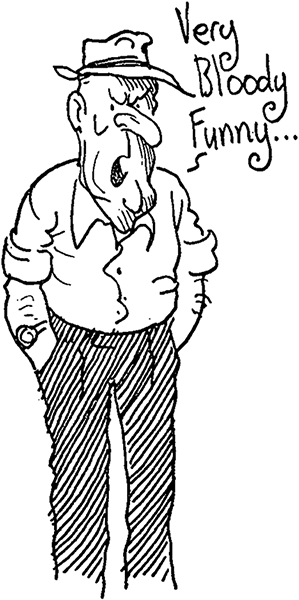
NINTH LETTER
THE MEDIUM is the TEDIUM
MOST COUNTRIES have some pastor of souls tenderly watching, forgiving transgressions, shepherding the nation toward salvation. In Britain, the Church of England, in Egypt, Islam, in India, Hinduism. In New Zealand the media do the job, and even manage to declare a dividend on it.
You think of the media as a dynamic force, criticising, stimulating, questioning. Such organs do not transplant. The happy medians are a priesthood. When we doubt, they reassure the people; they comfort their isolation, assuage their uncertainties, remind them that all is for the best in the best of possible countries. The media’s business is balm distribution, wholesale and retail. Overseas, the media criticise and question in a climate where all is not well. In New Zealand it is. The media can get on with their real job of reassurance.
Let’s begin our survey of the varieties of religious experience with the established church, the three denominations née NZBC—to its intimates, ‘the corp’ (the se being silent). Where you come from a corporation is an independent organisation, like that centre of Black Power, the National Coal Board. Disabuse yourself. In New Zealand a corporation is a government department with freedom to choose its own letterheads. In 1960 the National Party was anxious to present itself as the party of constitutional rectitude. It was also aware that television was coming, and could be more embarrassing for a government department to handle than, say, hydatids dosing. Yet the corporations can be troublesomely independent, whereas they should be seen and not heard. So the NZBC was treated like the tamarillo (née tree tomato): the name was changed and the creature kept the same. Symbolically, Broadcasting House was built cowering beneath the Bowen State Building and hiding behind Parliament.
The NZBC posed as much danger to the public peace as a Pekinese being taken out for walks on the end of a four inch steel cable. The corporation had to comply with any general or special directions given in writing by the minister, though since the minister responsible is usually the least literate, he prefers to pick up the telephone. Any telephone call reduced the NZBC to jelly.
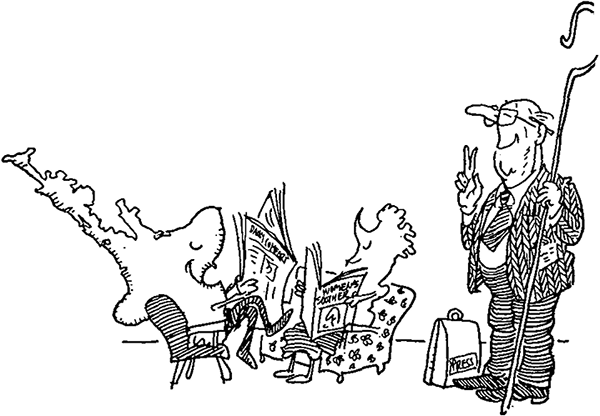
The National Government rewarded devoted servants of the National Party by appointing them to the corporation. Indeed if it had appointed any more, they would have been able to form their own party branch. The only real qualification for the job was to have no knowledge of television. The Labour Party, believing in the continuous creation of corporations, then divided the NZBC into three, like Caesar’s Gaul.
The new corporations are a new dimension of administrative theory. The corporations do what is wanted without appearing to be told. If one does anything someone disapproves of, this can always be disavowed as a consequence of independence. If only show business had shown the same skill in developing the ventriloquist-less dummy.
Mark you, the whole structure is unnecessary. No corporation has any desire for independence. Overseas they speak of the immense power of television. In New Zealand we know its immense timidity, like a steamroller whose driver lives in terror of virus infection from the crowds milling under his wheels. Real freedom could be too much to bear; witness the state of desolation the NZBC found itself in when the government did naughty things like allowing privately controlled radio. Like a hysterical wife suspecting the husband she’s been loyal to for forty years of adultery, the corporations alternate between hysterical plate throwing and even more hysterical self-abasement. Sometimes none of the poodle’s tricks please. Imagine the consternation when you cancel the Brian Edwards Show and a minister promptly condemns you for it.
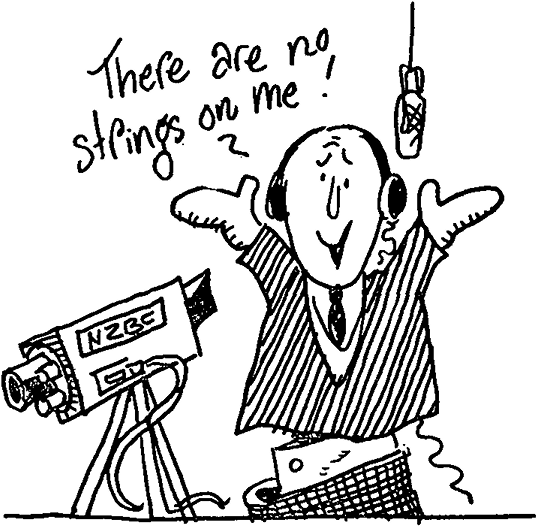
Yet don’t fear a divorce. Conjugal bliss will return after the sulks. After all the corporations fear everyone else more than the government. Pressure groups protest at programmes or demand time; viewers write to the papers, or even ring the studios; MPs complain to the ministers; puritans protest about the sexual significance of showing the Apollo docking manoeuvre. Each corporation has to protect itself against such a cruel world—by setting up Regional Advisory Committees. Now representatives of every conceivable pressure group can air their views in confidence and this has a pacifying effect.
Конец ознакомительного фрагмента.
Текст предоставлен ООО «ЛитРес».
Прочитайте эту книгу целиком, купив полную легальную версию на ЛитРес.
Безопасно оплатить книгу можно банковской картой Visa, MasterCard, Maestro, со счета мобильного телефона, с платежного терминала, в салоне МТС или Связной, через PayPal, WebMoney, Яндекс.Деньги, QIWI Кошелек, бонусными картами или другим удобным Вам способом.



